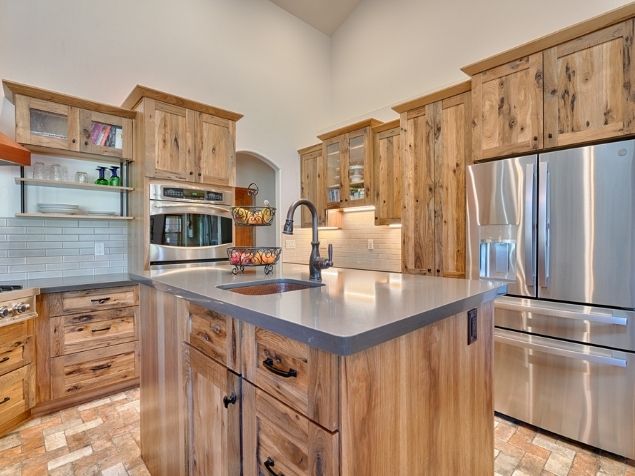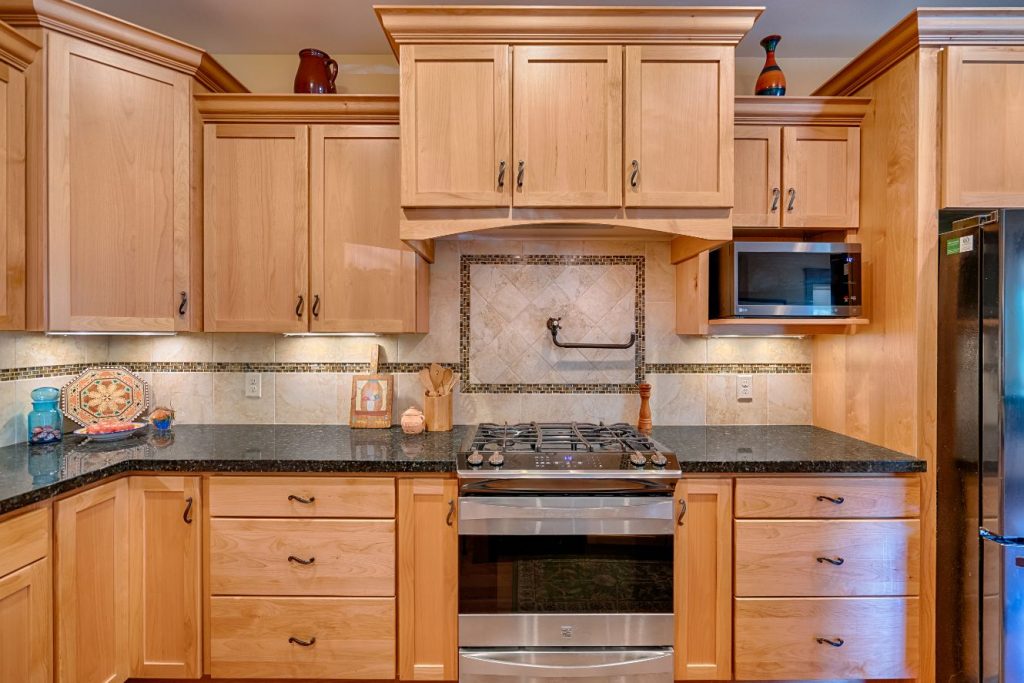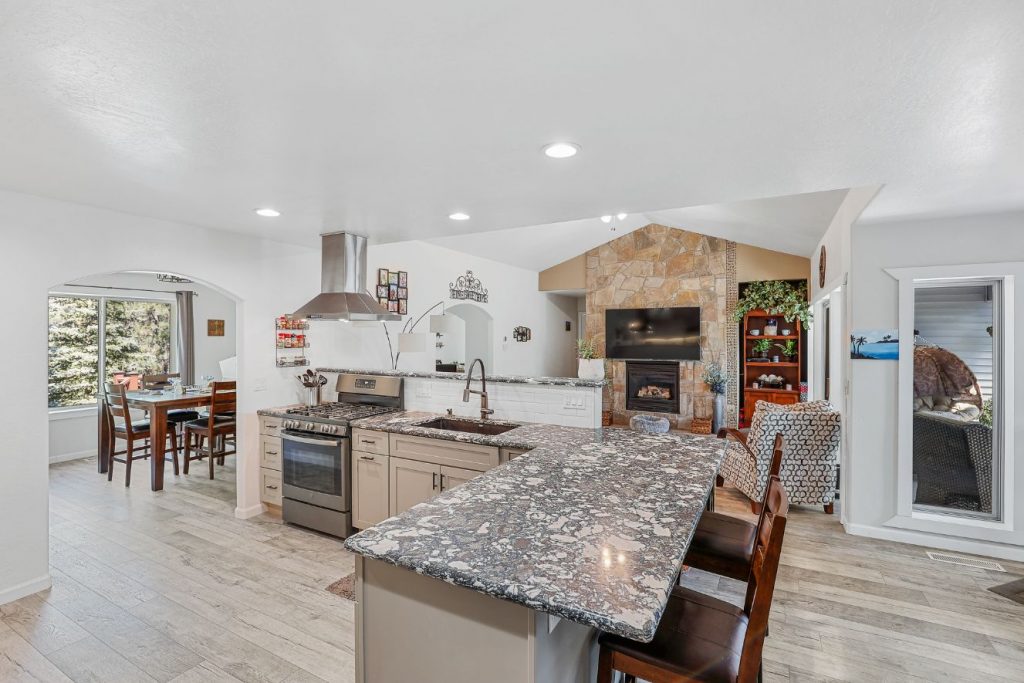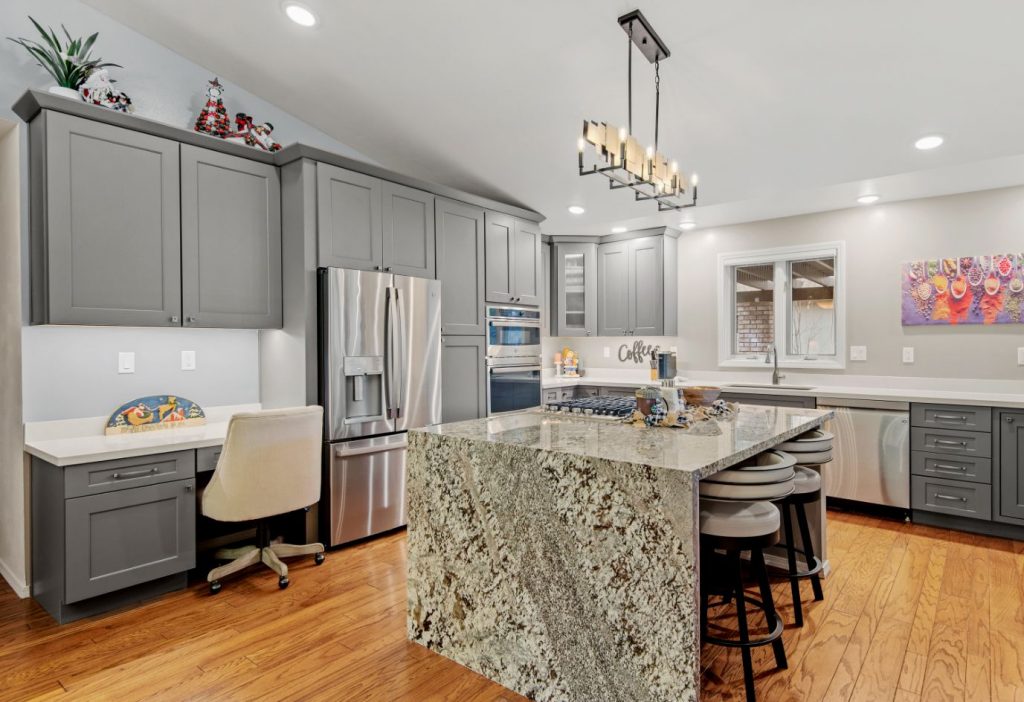
9 Best Kitchen Countertop Materials
When it comes to designing your “perfect” kitchen, one of the most important features is the countertops. After all, the countertops are where the preparation and cooking occur. You’ll be spending a lot of time with them, so it’s only natural that you want something functional as well as something that looks nice.
Some people will even go as far as saying the countertops are the centerpiece of their kitchen remodel. There are so many options available, and it can be a challenge to find the best one.
However, in this article, we’re going to discuss the best kitchen countertop materials to help you understand some of your options, including the advantages and disadvantages of each.
These materials include:
- Granite
- Marble
- Natural Quartz
- Quartzite
- Onyx
- Dolomite
- Porcelain
- Limestone
- Travertine
Keep reading to learn more about choosing the best countertop for your kitchen.
9 Best Kitchen Countertops
From the traditional to the cutting-edge, the low-maintenance to the Prima Donnas of the countertop world, let’s dive into the wide variety of kitchen countertop materials available.

AZ Tile Granite
#1 Granite
Granite is one of the most elegant options when it comes to kitchen countertops. It has always been one of the most popular and, until recently, one of the most expensive. This material can make even the most modest kitchen look and feel like a luxury space.
Recently, granite countertops have become much more affordable. Plus, there are so many shades, colors, and patterns that you will be able to create the look you desire, whether you prefer more classic, more modern, or you fall somewhere in between.
Granite is also a great option for an outdoor kitchen.
Advantages
- Solid
- Durable
- Resistant to scratches, cuts, heats, chips
- More than 3,000 options
Disadvantages
- Must be regularly sealed to maintain resistance to scratches and staining
- Must be repaired by professionals if damage occurs.
#2 Marble
Marble is a high-end, luxury countertop material and has a price tag that matches its luxuriousness. Marble countertops can be combined with other countertop materials or installed in specific areas, such as an island.
Advantages
- Available in several natural, beautiful colors and patterns
- Makes your home feel luxurious
- Resistant to heat and water
Disadvantages
- Not resistant to chipping, scratching, cracking, or staining
- Must be sealed from time to time, as it wears off
- Expensive

Cambria Quartz
#3 Quartz
Suppose you prefer a more contemporary, modern countertop material in your kitchen. In that case, you should put natural quartz at the top of your list. This is a man-made stone that is durable and robust. It’s designed to mimic natural stone, such as granite and marble. Quartz is shaped with resin and is approximately 93% quartz crystals/other minerals.
Advantages
- Available in a variety of colors
- Non-porous
- Resistant to scratching and staining
- Easy to maintain
Disadvantages
- Edges/corners can get chipped – you’ll need a professional for this
- Natural quartz countertops can cost more than granite
- Slabs are heavy
#4 Quartzite
Quartzite is often confused with quartz, but they are actually different. Quartzite is a naturally occurring stone that is quarried a lot like granite. So it looks a lot like marble but is much easier to care for.
Advantages
- Looks like marble
- Low maintenance
- Durable
- UV resistant
Disadvantages
- Easily damaged by sharp objects
- Quartzite countertops cannot withstand high heat
- Must be sealed more often than some
- Limited color choices
#5 Onyx
Onyx is a natural stone. Its extravagant beauty makes it popular among homeowners who want a truly unique look, and have the budget to spend a lot on their countertops. However, onyx countertops can be challenging to install, so it’s usually seen as an accent piece, such as a bar.
Advantages
- Looks great
- Durable when maintained properly
- Rare- formed on the surface, near ground or spring water – not within the earth’s crust like some other stones
- Translucent – light can shine through when placed behind
- Lightweight – much lighter than other natural stones
Disadvantages
- Cost
- Fragile – requires a lot of maintenance
- Maintenance – must be sealed upon installation and must be cleaned with a special stone cleaner to keep away scratches and stains
#6 Dolomite
Suppose you want a gorgeous countertop that compliments your décor at an affordable price. In that case, dolomite might be the perfect option for you. Dolomite is also known as dolostone and is increasing in popularity as consumers become more aware of it.
Advantages
- Heat resistant
- Pressure resistant – so you don’t have to worry about heavy pots and pans causing cracks in your countertop
- Harder than average
- Dolomite countertops are not as fragile as marble
- Gorgeous aesthetic
- Lower install cost
- Easy to care for
Disadvantages
- Not scratch resistant – while harder than many stones, it’s softer than granite and can be scratched
- Not stain resistant
- Porous – must be sealed to prevent stains
#7 Porcelain
Porcelain countertops have been popular in Europe for some time now. Still, they’ve only recently gained attention in the United States. Porcelain is a dense material that is nearly impossible to damage with UV rays, stains, heat, chips, scratches, or cracks. During the manufacturing process, various pigmented glazes are added to create a variety of colors and patterns.
Advantages
- Stain-resistant
- Heat resistant
- Scratch-resistant
- Chemical resistant
- Hard & durable
- UV resistant
- Variety of colors and patterns available
- Usually doesn’t need sealing
Disadvantages
- Beauty is on the surface – that is, the designs are basically printed
- May be scratched with ceramic knives – you can avoid this by always using a cutting board or just not using ceramic knives
- Limited supply and availability in the USA because it’s still so new
#8 Limestone
Limestone countertops are rapidly gaining popularity. This could be due to the fact that limestone looks something like marble without the hefty price tag. It is made up of exoskeletons of calcium carbonate, coral, algae, and shells. Since ancient times, this has been the “go-to” stone for builders because it’s so easy to cut and work with.
Advantages
- Brings added value to the home
- Durable
- Unique natural development
- Sophisticated material
- Deluxe appearance
Disadvantages
- Not scratch resistant
- Not stain resistant
#9 Travertine
Travertine is a gorgeous, sophisticated material that has been a favorite of homeowners for some time now. Though it has been around since the times of the Romans, it has recently surged in popularity. There are two options: crosscut and vein-cut. In crosscut, veins are avoided, but with vein-cut the cuts are made along the veins.
Advantages
- Rich, polished surface
- Elegant aesthetic
- Timeless and sophisticated, with the pits and veins throughout
- Travertine countertops are resilient
- Durable
- Variety of designs to choose from
Disadvantages
- Reactive to acidic solvents
- Must be cleaned with alkaline cleaners due to the cavities and pits throughout
- Must be polished and resealed periodically to retain the beauty.

AZ Tile Granite & Quartz
Conclusion
Now that you have a better understanding of the advantages and disadvantages of some of the most popular kitchen countertop materials available, it’s time to choose the perfect one for you! Whether you choose to make your countertop more of a centerpiece with rich marble or to achieve the clean look of snowy white quartz, your kitchen countertops are a great way to express yourself and create a space you’ll love spending time in.
Which will you choose? Let us know in the comments!
Click here to check out custom cabinetry options.





